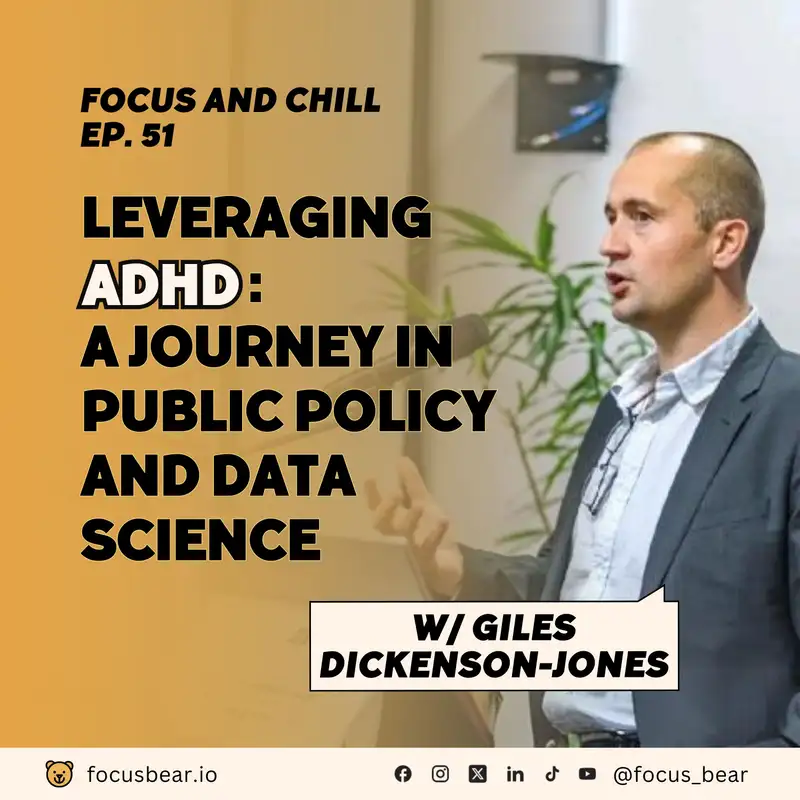Welcome to episode #51 We’re thrilled to be joined by Giles Dickenson-Jones today.
Giles is an independent consultant specializing in public policy (economics), international development, and data science. Giles was diagnosed with ADHD in his early teens and was shuttled off to one of the few schools he hadn't already been kicked out of: a boarding school in rural NSW.
Giles leverages his ADHD by combining his interdisciplinary range, creativity, and expertise in data analytics to help clients tackle tough public policy problems.
Welcome to the show Giles!
Questions
- Can you tell us about your experience with neurodiversity? When did you realize that you weren’t neurotypical? What challenges did you face? What is it like now?
- Grew up in rural NSW
- Diagnosed with ADHD amidst being shuffled across schools.
- Initially confused
- Initially thought it meant he wasn’t getting enough attention.
- Coping strategies didn’t stick
- Interpreted it as lacking in something as an explanation of why he was different.
- How he sees it now:
- Knows he was different
- Was working ahead to fit in
- Strong sense of justice, hyperfocused on that
- Acting out
- Getting approval from others
- So eager to fit in
- Somehow not be the
- Cool kid
- Dorky kid
- Almost got into a Montessori-style school
- But mother wanted tougher discipline
- How neuro divergence led to the current line of work
- Analytical framework hooked him
- Economics sticks its nose into everything
- Range, Epstein
- How has your neurodivergence affected your financial life?
- Special interest in finance including personal finances - complicated Excel model + savings model
- How has it affected your relationships?
- Enjoys socialising but won’t organise it
- Work often gets in the way.
- Blind to the need of tending to relationships.
- Interested in people
- Likes the diversity and variety of Lunchclub
- What "work" projects are you concentrating on?
- Independent economic consultant
- Program evaluation of social policies, e.g. how to help more students graduate
- How can we make the policy stronger (without incurring additional costs)?
- Board member of local NFP
- Policy Analysis Lab
- Online course teaching policy analysts how to use data science
- How to work with messy data
- How to clean it up
- How about the rest of the time? What do you enjoy doing in your off time?
- Quit drinking in 2015
- Found it difficult to continue
- Replaced it with art classes
- COMMERCIAL BREAK
- What does your morning routine look like and how has it evolved over time?
- Set up day similar to 9 to 5 job
- Get up at 6 am
- Go to the gym (do boxing)
- Review to-do list
- What do you do to optimize productivity during your working hours?
- Normally external deadlines push him to hyperfocus
- Softer deadlines are harder (e.g. finishing the online course)
- Go to the library for focus
- Turn on hyperfocus
- Keep desk distraction-free
- Simple structures/routines
- Momentum method - get started with easy tasks
- Make tasks really small (break down responding to an email into - read email, write email, hit send).
- Reduce friction for good habits
- Hiring freelancers - keeps him accountable
- Similar to body doubling.
- What is one habit you'd like to remove from your life (either a bad habit or one that takes up too much time)?
- Watching videos while having meals (lowers boredom threshold)
- How do you switch off at night?
- In theory
- Get to sleep by ten.
- Loose during the holidays
- Practically
- Keeps the 6 AM boxing class
- Fun
- Fitness
- Discipline, consequences for staying up late
- What resources (books, philosophies, apps, sensory toys) do you find most helpful for dealing with your brain?
- Apps:
- OneNote for organizing notes
- Excel for To Do lists
- Chat GPT
- Focus Coach: ADHD Coach GPT
- Askly
- Pocket for reading later (on Kobo)
- Read aloud (proofreading own work, reading websites)
- Etsy
- Books:
- “Deep Work” Cal Newport
- Range by David Epstein
- “How to have a good day”
- Where can people connect with you or find your work?
- Etsy store - Turkey cards
- LinkedIn
- Website - gilesdj.com?
- Do you have any final words or asks for our audience?
- The emperor has no clothes: the person you are putting on the pedestal has foibles and got where they are through a combination of hard work and good luck. You can get there too.
 Episode 50
Episode 50